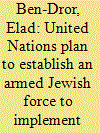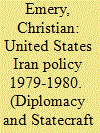| Srl | Item |
| 1 |
ID:
126333


|
|
|
|
|
| Publication |
2013.
|
| Summary/Abstract |
Nikita Khrushchev and Nikolai Bulganin's visit to Britain in April 1956 was the first by the new Soviet leadership to a Western bloc country after Josef Stalin's death. It presented British policy-makers with a unique opportunity for insight and discussion. However, British self-deception regarding their scope for independent action as well as excessive focus on events in the Middle East hampered efforts to build a rapport with Khrushchev and Bulganin. This analysis explores the planning and conduct of what turned out to be a fruitless diplomatic initiative. The visit illustrates British and Soviet policy at the time, as well as Britain's already clear position as the junior partner in the Anglo-American "special relationship" on the eve of Suez.
|
|
|
|
|
|
|
|
|
|
|
|
|
|
|
|
| 2 |
ID:
126343


|
|
|
|
|
| Publication |
2013.
|
| Summary/Abstract |
The analysis examines the origins and implementation of the Greek diplomatic initiative for multilateral co-operation amongst the Balkan states in the aftermath of the Helsinki Act of the Conference for Security and Cooperation in Europe (CSCE). Notwithstanding pressing domestic and security concerns, détente and, in particular, the spirit of the CSCE process significantly influenced Greek Prime Minister Constantinos Karamanlis' decision to instigate Balkan co-operation on a multilateral and not just on a bilateral level. The "Helsinki spirit" opened a window of opportunity for regional Powers from different blocs to come together. Despite its limited results, the political significance of the Athens Conference lay in the fact that it took place at all in view of Cold War realities and inter-Balkan rivalries.
|
|
|
|
|
|
|
|
|
|
|
|
|
|
|
|
| 3 |
ID:
126319


|
|
|
|
|
| Publication |
2013.
|
| Summary/Abstract |
René Massigli's considerable contribution to French diplomacy began during the First World War. After being closely involved with many significant developments in French foreign policy during the inter-war years, Massigli then served alongside Charles de Gaulle during the Second World War. Informed by his experience of the 1930s, he adopted a view of western European security that saw him determined to promote greater co-operation between France and Britain to withstand a potential German resurgence and a looming Soviet threat. But following France's efforts after 1950 to promote European integration based on Franco-German co-operation, Massigli re-defined his role of ambassador and openly challenged French initiatives such as the Schuman Plan and, in particular, the European Defence Community, not only because they did not include Britain, but also because they threatened his view of French security. This analysis assesses Massigli's strategic vision and his attempts to overcome the underlying constraints.
|
|
|
|
|
|
|
|
|
|
|
|
|
|
|
|
| 4 |
ID:
126360


|
|
|
|
|
| Publication |
2013.
|
| Summary/Abstract |
This article reconsiders the negotiations between the United States and Britain at the outbreak of the 1982 Falklands War. The Reagan Administration did not support Britain, its staunchest NATO ally, and on the contrary assumed an even-handed position that recognised Argentina as a key ally as much as Britain. Not only did American mediation fail; it also caused a major crisis in Anglo-American relations. The underlying reason for the American decision was the obsessive importance that the Administration attached to fighting communism in Latin America after establishing covert co-operation with the Argentinian military junta in 1981.
|
|
|
|
|
|
|
|
|
|
|
|
|
|
|
|
| 5 |
ID:
126325


|
|
|
|
|
| Publication |
2013.
|
| Summary/Abstract |
On 29 November 1947, the United Nations General Assembly voted to partition Palestine into two independent states, Jewish and Arab, with Jerusalem as a corpus separatum under international control. The General Assembly then established the United Nations Palestine Commission to implement partition. Amongst other things, the Commission was to establish "armed militias" under UN supervision to help realise the plan. The analysis examines various aspects of the sequence of events related to this idea, from its conception in the General Assembly to its death in February 1948. It demonstrates that under the militia clause, the United Nations intended to rely on the Jews' main military organisation - the Haganah - to establish the Jewish state and shows how and why this plan went awry despite the converging interests of the Jews and the United Nations.
|
|
|
|
|
|
|
|
|
|
|
|
|
|
|
|
| 6 |
ID:
126350


|
|
|
|
|
| Publication |
2013.
|
| Summary/Abstract |
The confrontation between the United States and Iran may now appear so ideologically entrenched and vitriolic that it is easy to lose sight of the importance that the United States placed on reaching an accommodation with the nascent Islamic Republic in 1979. Contrary to the claims of the current Iranian leadership, there was no instinctive American hostility. Rather than conspiring to bring down the nascent Islamic Republic, Washington fretted over Iran's fragility and saw its destabilisation as a likely precursor to Soviet adventurism in the Persian Gulf. The Carter Administration went to significant lengths to engage the new regime, but its good intentions were not enough. This analysis explores the misperceptions and faulty thinking that characterised the development and execution of Washington's engagement strategy. It then goes beyond the collapse of engagement to show how American objectives were refashioned after the hostage crisis and Soviet intervention in Afghanistan.
|
|
|
|
|
|
|
|
|
|
|
|
|
|
|
|